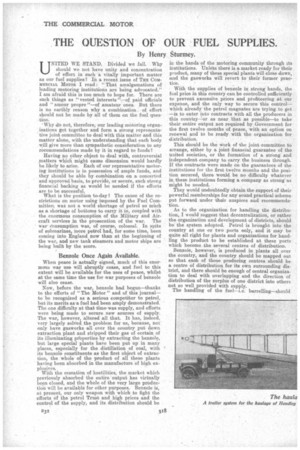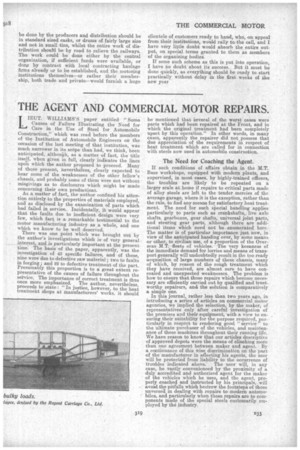THE QUESTION OF OUR FUEL SUPPLIES.
Page 10

Page 11

If you've noticed an error in this article please click here to report it so we can fix it.
By Henry Sturmey.
LJNITED WE STAND. Divided we fall. Why should we not have unity and concentration of effort in such a vitally important matter as our fuel supplies? In a recent issue of TEE COMMERCIAL Minos. I read : "That amalgamations of leading motoring institutions are being advocated." I am afraid this is too much to hope for. There are such things as !` vested interests "—of paid officials and "amour propre "—of amateur ones. But there is no earthly reason. why a combination of effort should not be made by all of them on the fuel question.
'Why do not, therefore, our leading motoring organizations get together and form a strong representa. tive joint committee to deal -with this matter and this matter alone, with the understanding that each body will give more than sympathetic consideration to any recommendations made by it in regard to funds?
Having no other object to deal with, controversial matters which might cause dissension would hardly be likely to arise. Each of our representative motoring institutions is in possession of ample funds, and they should be able by combination on a concerted and approved basis, to provide, or secure, such strong financial backing as would be needed if the efforts are to be successful.
What is the position -to-day? The cause of the restrictions on motor using imposed by the Fuel Committee, was not a world shortage of petrol so snitch as a shortage of bottoms to carry it in, coupled with the enormous consumption of the Military and Aircraft services in the -prosecution of the war. The war Consumption was, of course, colossal. In spite of submarines, more petrol had, for some time, been coming into England now than at the beginning of the war, and new tank steamers and motor ships are being built by the score.
Benzole Once Again Available.
When peace is actually signed, much of this enormous war use will abruptly cease, and fuel to this extent will be available for the uses of peace, whilst at the same time the use for war purposes of benzole will also cease.
Now, before the war, benzoic had begun—thanks to the efforts of "The Motor" and of this journal— to be recognized as a serious competitor to petrol, but its merits as a fuel had been amply demonstrated. The one difficulty at that timeswas supply, and efforts -were being made to secure new sources of supply. The war, however, altered all that. It has, indeed, very largely solved the problem for us, because, not only have gasworks all over the country put down extraction plant and stripped their gas of certain of its illuminating properties-by extracting the benzoic, but large special plants have been put up in many places, especially for the distillation of coal, with its benzole constituents as the first object of extraction, the whole of the product of all these plants having been absorbed in the manufacture of high explosives. With the cessation of hostilities, the market which previously absorbed the entire 'output has virtually been closed, and the whole of the very large production will be available for other purposes. Benzole is, at present, our only weapon with which to fight the efforts of the petrol Trust and high prices and the control of the supply, and its distribution should be B32 318 in the hands of the motoring community through its institutions. Unless there is a market ready for their product, many of these special plants will close down, and the gasworks will revert to their former practice.
With the supplies of benzole in strong hands, the fuel prick in this country can be controlled sufficiently to prevent excessive prices and profiteering at our expense, and the only way to secure this control— which already the petrol magnates are trying to get --is to enter into contracts with all the producers in this country–or as near that as possible—to take their entire output not required by Government for the first twelve months of peace, with an option on renewal and to be ready with the organization for distribution.
This should be the work of the joint committee to arrange, either by a. joint financial guarantee of the united societies, or the formation of a strong and independent company to carry the business through. If the contracts were made on the guarantees of the institutions for the first twelve months and the position secured, there would be no difficulty whatever in these institutions forming a company as strong -as might be needed.
They would undoubtedly obtain the support of their powerful memberships for any sound practical scheme put forward under their auspices and recommenda-tion.
As to the organization for handling the distribution, I would suggest that decentralization, or rather the organization and development of districts, should be the system adapted. Petrol is brought into the country at one or two ports only, and it may be quite all right for plants and organizations for handling the product to be established at these ports which become the several centres of distribution.
Benzole, however, is produced in plants all over the country, and the country should be mapped out so that each of those producing centres should be a centre of distribution for its own surrounding district, and there should be enough of central organization to deal with overlapping and the direction of distribution of the surplus of one district into others not so well provided with supply. The handling of the fuel—i.e. barrelling—should be done by the producers and distribution should be in standard sized casks, or drums of fairly large size and not in small tins, whilst the entire work of distribution should be by road to relieve the railways. The work could be done either by the central organization, if sufficient funds were available, or done by contract with local contracting haulage firms already or to be established, and the motoring institutions themselves—or rather their membership, both trade and private—would furnish a. huge clientele of customers ready to hand, who, on appeal from their institutions, would rally to the call, and I have very little doubt would absorb the entire output, on special terms granted to them as members of the organizing bodies.
If some such scheme as this is put into operation, I have no doubt about its success. But it must be done quickly, as everything should be ready to start practically without delay in the first weeks of the new year






















